This post may contain affiliate links. Read my disclosure policy here.
Jump to Recipe Jump to Video Print Recipe
Irish Soda Bread is a hearty, delicious addition to the dinner table. And fortunately, it is also incredibly quick and easy to make. Here is a fascinating look at Irish Soda Bread history and a tasty Traditional Irish Soda Bread recipe.

Have you ever made Irish Soda Bread? Whether or not this is your first time making it, once you follow this traditional Irish Soda Bread recipe that I’m about to share with you, you’ll be hooked!
If you do a little research on Traditional Irish Soda Bread, you’ll discover this is a controversial quick bread and understand why some websites call their versions “Soda Bread” and don’t include the word “Irish”. Because if you are going to call your bread Irish Soda Bread, you might run into some trouble if you start adding in sugar, eggs, butter, currents, etc.
Yes, I learned that a traditional Irish Soda Bread recipe contains FOUR ingredients, flour, baking soda, salt, and buttermilk. (Some argue traditional Irish Soda bread really only has three ingredients and doesn’t use salt. But I definitely prefer salt in my baking to bring out the flavors. So, I am going with the salted version.)
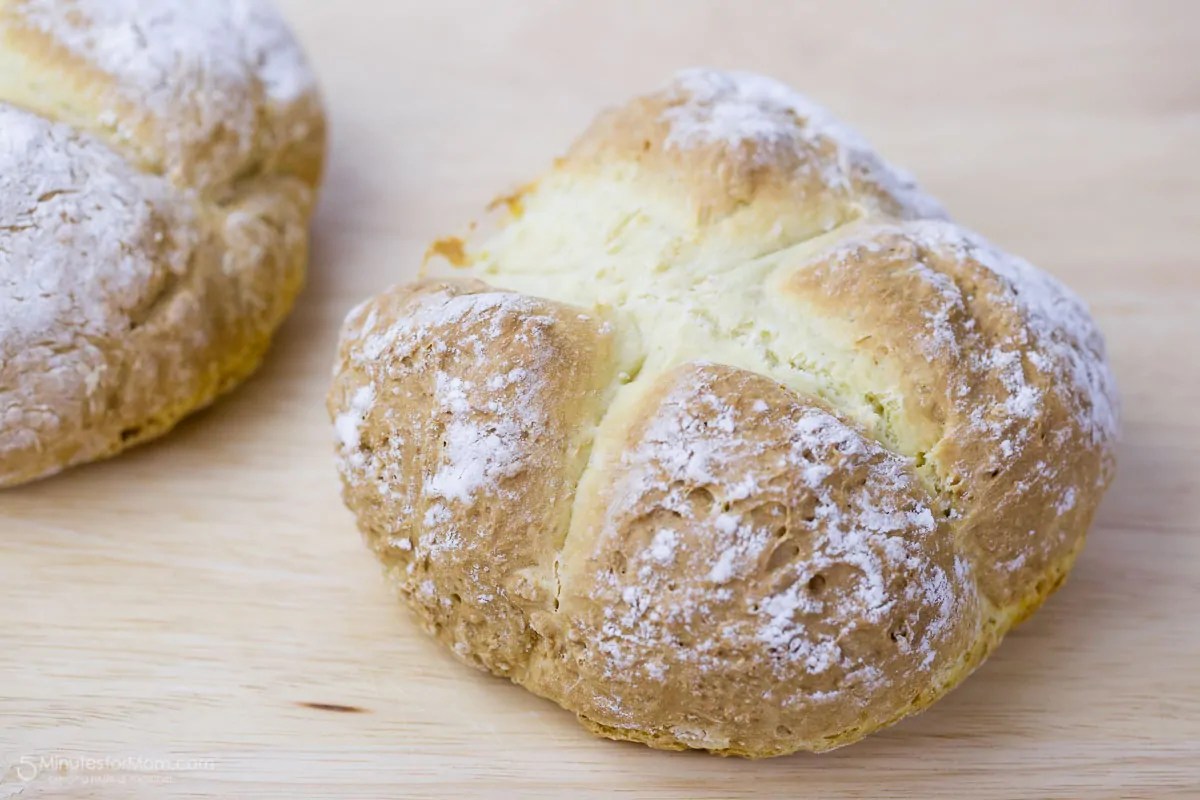
According to The Society for the Preservation of Irish Soda Bread, an Irish Soda bread has only these four ingredients. “Anything else added makes it a ‘Tea Cake!'”
I do hope you feel free of course to try different versions of breads made with an Irish Soda Bread base, such as sweet versions with sugar, currants or dried fruit, or savory versions with caraway seeds, fennel or dill. While these breads are not exactly following the traditional Irish Soda Bread recipe eaten since the mid-nineteenth century, no one is going to complain when they are enjoying your scrumptious creations.
How To Make Soda Bread Without Buttermilk
If you don’t have any buttermilk in your fridge right now, no worries!
You can make Irish soda bread without buttermilk. You simply “sour” regular milk with 2 Tbsp lemon juice or vinegar. Generally, whenever you’re baking and a recipe calls for buttermilk, you can substitute milk plus a couple tablespoons of lemon juice or white vinegar.

Irish Soda Bread History
I am a bit of history junkie. So naturally I devoured, (ouch that is a painful pun – so sorry,) the history of soda bread in Ireland.
Is Irish Soda Bread Really Irish?
While soda bread became an Irish dinner table staple, the Irish were not the first to discover the chemical reaction that creates soda bread. There are earlier references to Indigenous Americans using soda ash and pearl ash or “potash” to leaven their bread.
In America, early soda bread recipes first appeared by Amelia Simmons in 1796 in her book American Cookery and by Mary Randolph in 1824 in The Virginia Housewife.
Why Did The Irish Make Soda Bread?
Bicarbonate of soda only became readily available in Ireland in the 1840’s and one of the earliest recipes that has been found for soda bread in Ireland is from 1836.
But due to the potato famine and the poverty in Ireland, soda bread became a staple in the Irish diet from the mid 1800’s and on.
 photo credit: National Library of Ireland
photo credit: National Library of Ireland
This basic quick bread was simply the least expensive bread they could make. It only required flour, baking soda, and soured milk or buttermilk.
The wheat that grew in Ireland was a “soft wheat”. It has less gluten than the “hard wheat” that was more popular in America and the UK and does not work well with yeast.
In order to leaven breads with this soft wheat, (the Irish grew soft wheat and also imported from the US,) the Irish used buttermilk and bicarbonate of soda. These two ingredients were readily available as rural farmers would have buttermilk, as a by-product of making butter, and bicarbonate of soda, which was relatively inexpensive and not as perishable as yeast.
The acid in the buttermilk reacts with the base of bicarbonate of soda. This chemical reaction produces tiny bubbles of carbon dioxide that leavens the bread.
For these poor families, the result was quick and reliable, allowing families to avoid waste and easily make their own bread.
Since most rural families didn’t have ovens, but rather open hearths, the Irish baked their bread in griddles or in large cast-iron pots called bastibles.
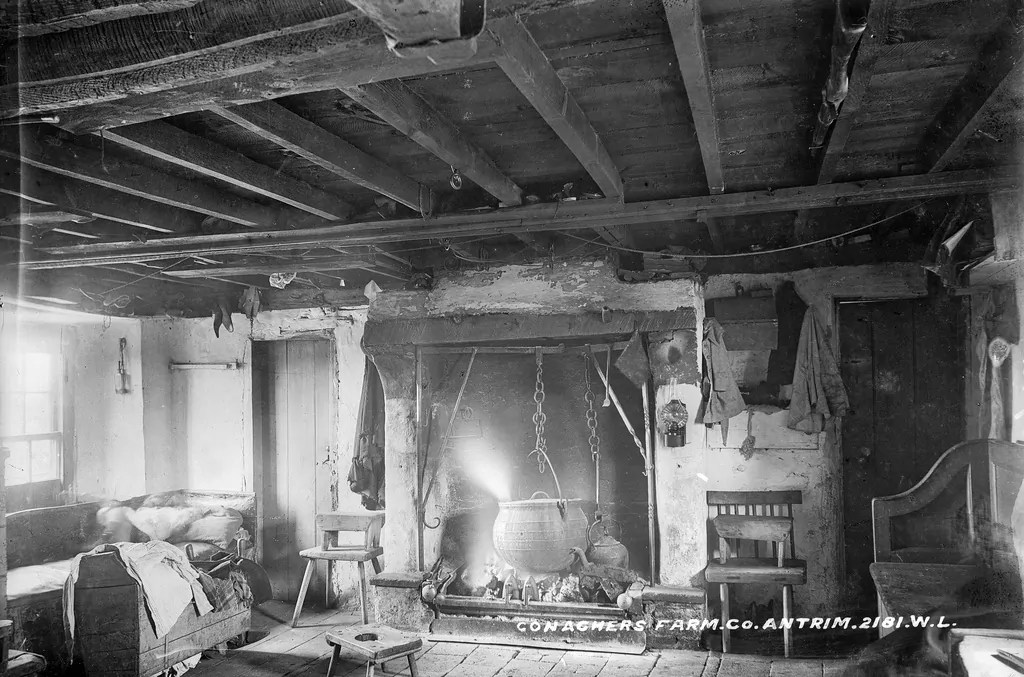 photo credit: National Library of Ireland
photo credit: National Library of Ireland
The bastible had a lid and could be put right onto the coals. The lid was sunken so coals could be placed on top of the pot as well.
The Irish cut a deep cross through the top of the round loaf before baking. It is often said that this cross is to ward off the devil and protect the household — but the cross serves a practical purpose of allowing the center of the bread to cook through and not be too dense or under cooked.
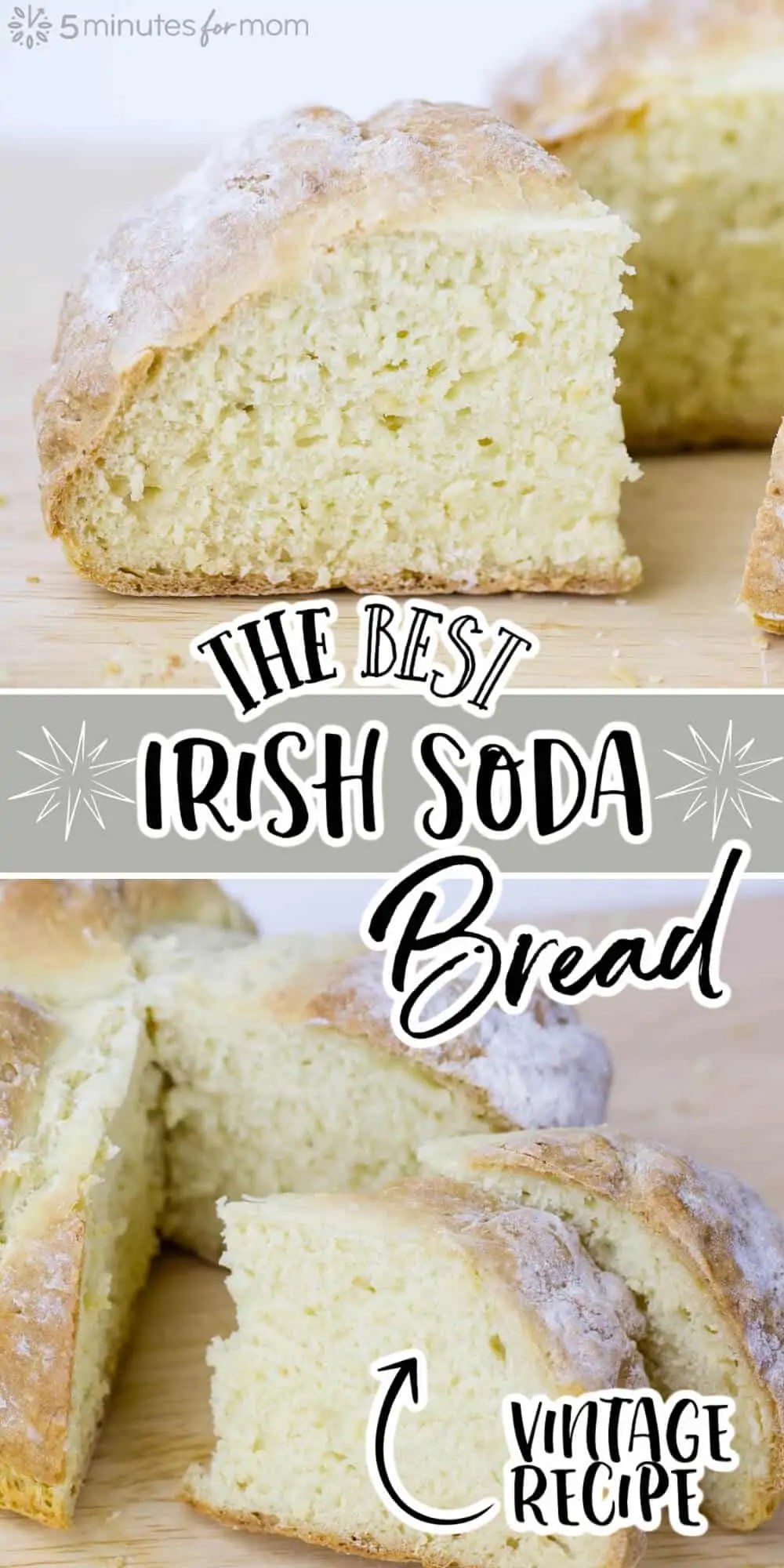
How to Bake Traditional Irish Soda Bread
Now that we have a firm grip on the Irish Soda Bread history, we can get down to the goodness of making it.
Irish Soda Bread is as easy to make as it is delicious to eat.
All you need is flour, buttermilk (or you can sour milk with vinegar or lemon juice,) baking soda, and salt.
What Type Of Flour Do You Use To Make Irish Soda Bread?
As I explained above, the Irish used a “soft flour” that has less gluten and is more similar to our “pastry flour.” I rarely have pastry flour on hand, so I have used all purpose flour for my soda bread.
You can also substitute a portion of the white flour for whole wheat flour and create a “Brown Bread.”
The amount of buttermilk or soured milk you will need will also depend on your flour. Start with adding 1 3/4 cups of milk. If your dough is too dry, add additional milk 1 tablespoon at a time. The dough will be sticky and moist.
Also, please not that if you “scoop” flour with a measuring cup, it can pack the flour too tightly and your measurement may be off. To try and avoid that problem, you can spoon the flour into the measuring cup to avoid packing it. Sifting the flour also can help. But ultimately, weighing flour is the best option if you want to ensure the most precise measurement.
After mixing in the buttermilk, turn the dough onto a floured surface and knead very lightly, just three or four times, forming the dough into a smooth circle.
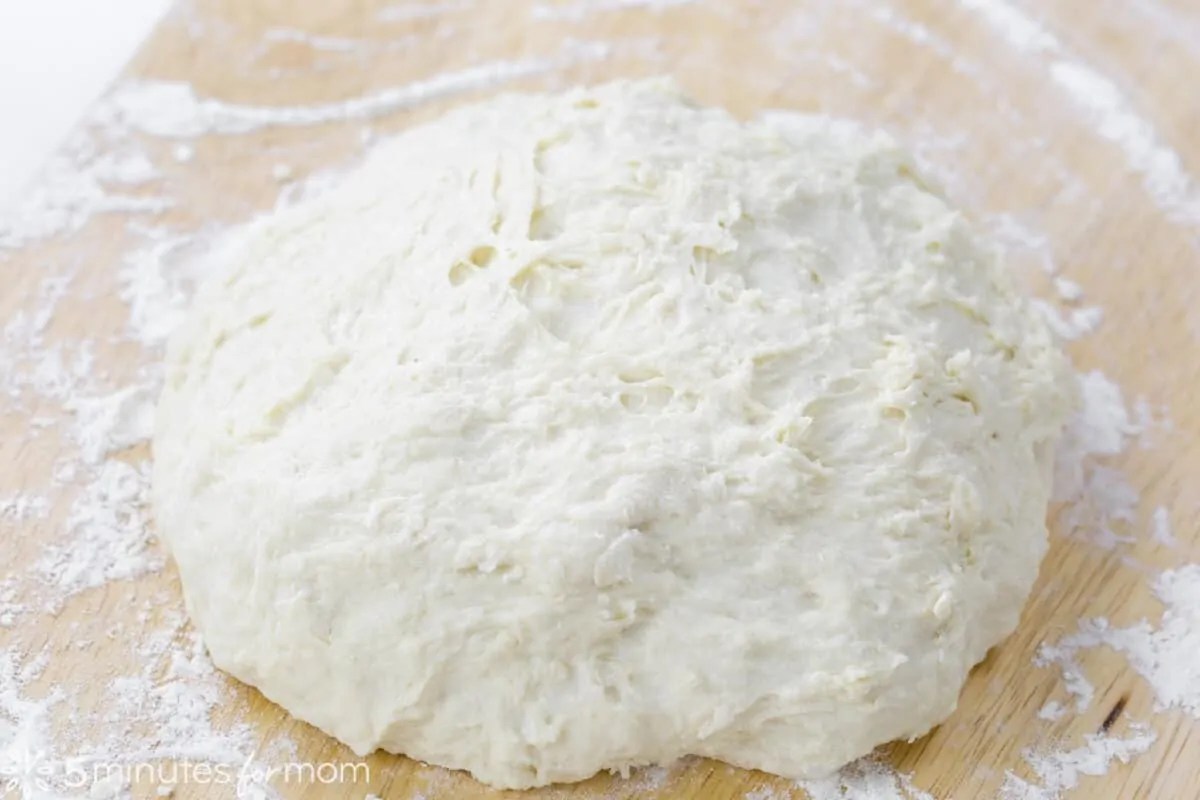
Tip – Do Not Over Knead Your Dough
When making your bread, keep in mind that the key to making good soda bread is to NOT over knead the dough. Working with the dough too much will toughen it.
My daughter thinks that kneading bread is the most fun part. So when I am baking soda bread with her it is very hard to convince her to stop mixing and only knead it three or four times.
If you would like two smaller loaves, after you make a large smooth ball, cut the dough into two smaller portions. Then gently reform into two smooth balls and place on a parchment lined baking sheet.

With a sharp knife, cut a deep ‘X’ across the top of your loaf or loaves. You can then brush with buttermilk (and melted butter if you want, I won’t tell anyone). You can sprinkle the loaves with flour if you like the look of a flour dusted loaf of bread.
Do You Make Irish Soda Bread In A Cast Iron Pot?
While traditional Irish Soda Bread is made in a cast iron pot, you can bake your bread with whatever you have available — a baking sheet, a cast iron skillet or pot, a baking stone. Whichever you prefer.

If you want to use a more traditional baking method, cover your pot or baking dish with a lid (another pan can serve as a lid to simulate the bastible pot) for the first 2/3 thirds of baking and then remove for the last 1/3 third of baking time.
You can use a parchment lined baking sheet and tent the bread with aluminum foil for a portion of the baking time. (Please let me know in comments what method works best for you.)
Bake your Irish soda bread at 400 F (or 425 F — you may want to experiment to find which works best in your oven.) If you are making a large loaf, you will probably need to bake it for about 45 minutes. If you are making two smaller loaves, you will want to reduce your baking time to about 35 minutes.
If you are using a lid or tenting with aluminum foil, remove the lid after 30 minutes (or 25 minutes for smaller loaves.)
If you are not using a lid or foil, after 25 or 30 minutes, check if your bread is getting two brown. You will probably want to tent it at that point with foil.
You can see that your bread is ready when the center X looks baked through and a toothpick comes out clean. As well, you can tap the bottom of the loaf and it should sound hollow.

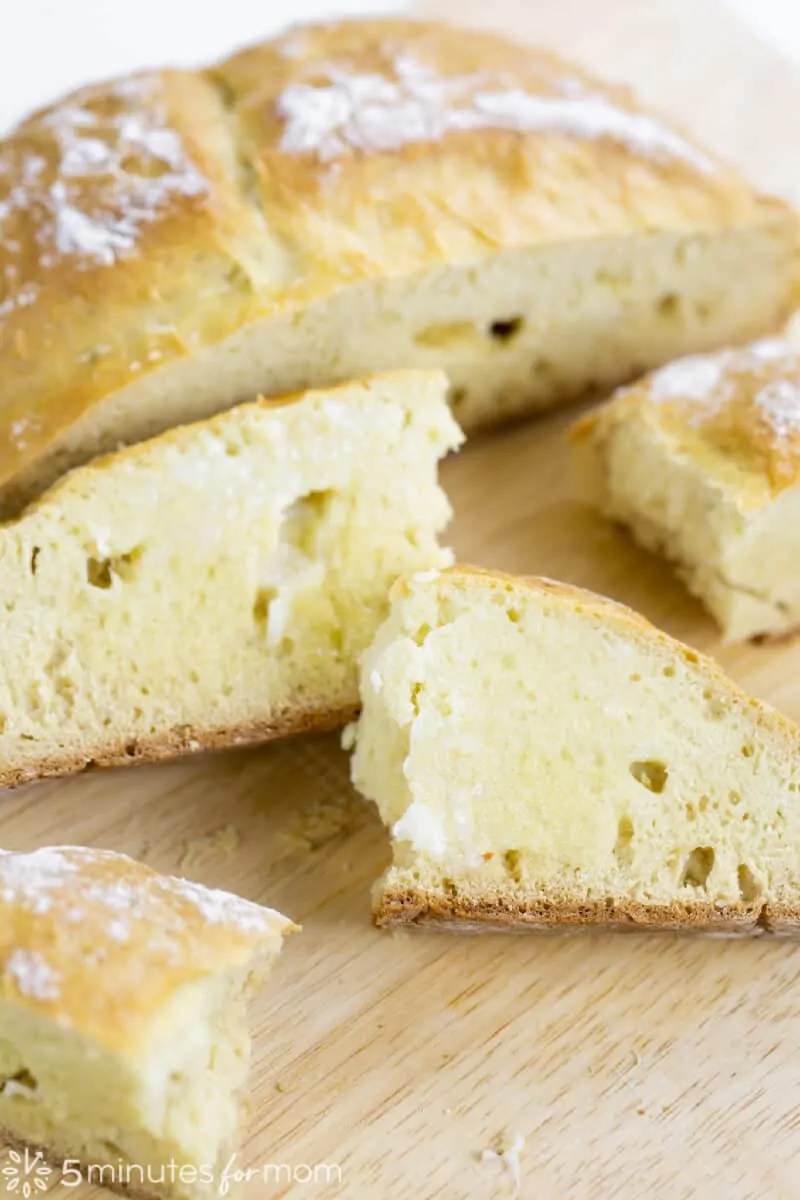
Do You serve Irish Soda Bread Warm?
After you remove the loaf from the oven, cover it with a tea towel and wait at least ten minutes before breaking into it. I know it is so hard to wait. But if you cut into the bread too soon, it will be gummy.
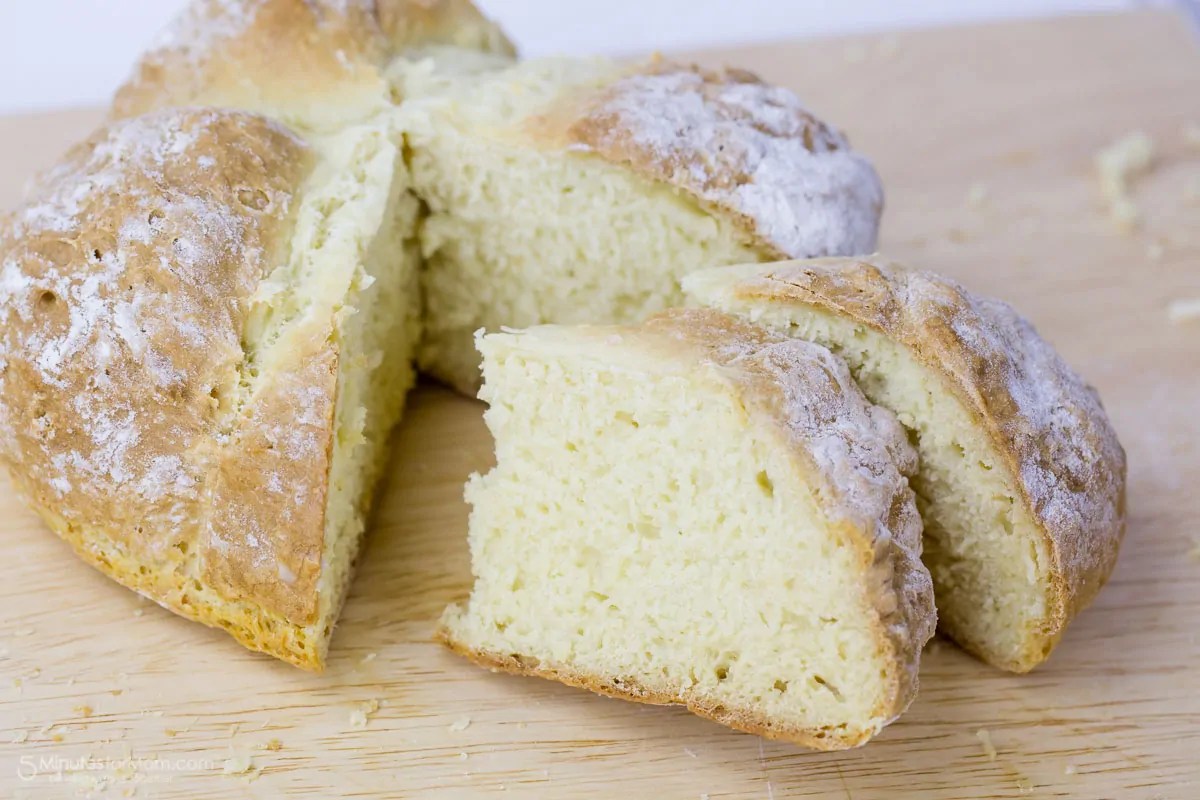
How Do You Keep Irish Soda Bread Fresh?
Ever since we first published this recipe in 2017, we’ve been asked this question a lot! It is true that Irish Soda Bread dries out quickly. We wrap ours tightly in plastic wrap and try to eat it within 2-3 days. Also, when serving it after the first day, we often toast it.
Can you freeze soda bread?
Yes, you can freeze soda bread and it will last a couple of months in the freezer.
But usually, we enjoy our bread within the first couple of days after we make it. Then we simply make a fresh new batch for the next time we want this delicious, hearty bread.
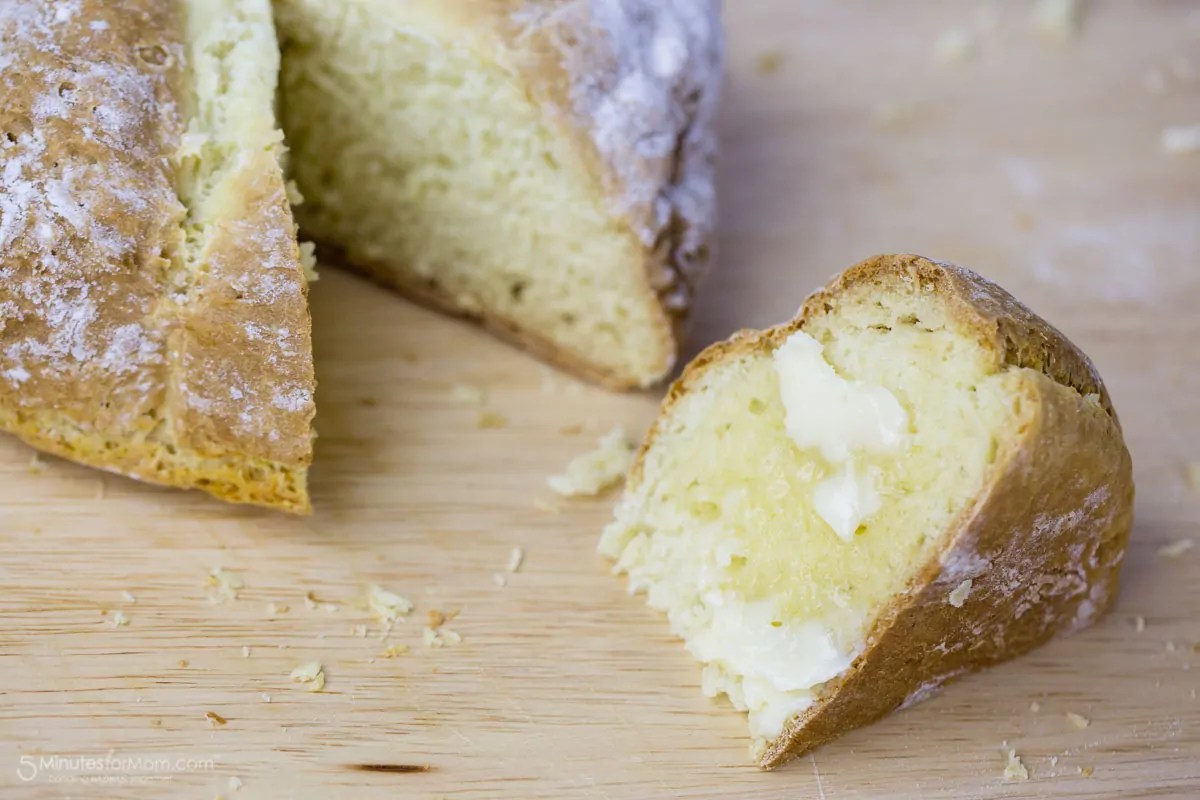
When your soda bread has cooled for at least ten minutes, serve with salted butter and whatever else your heart desires.
A sweet treat is to pour honey on the bread or sprinkle on some cinnamon sugar.
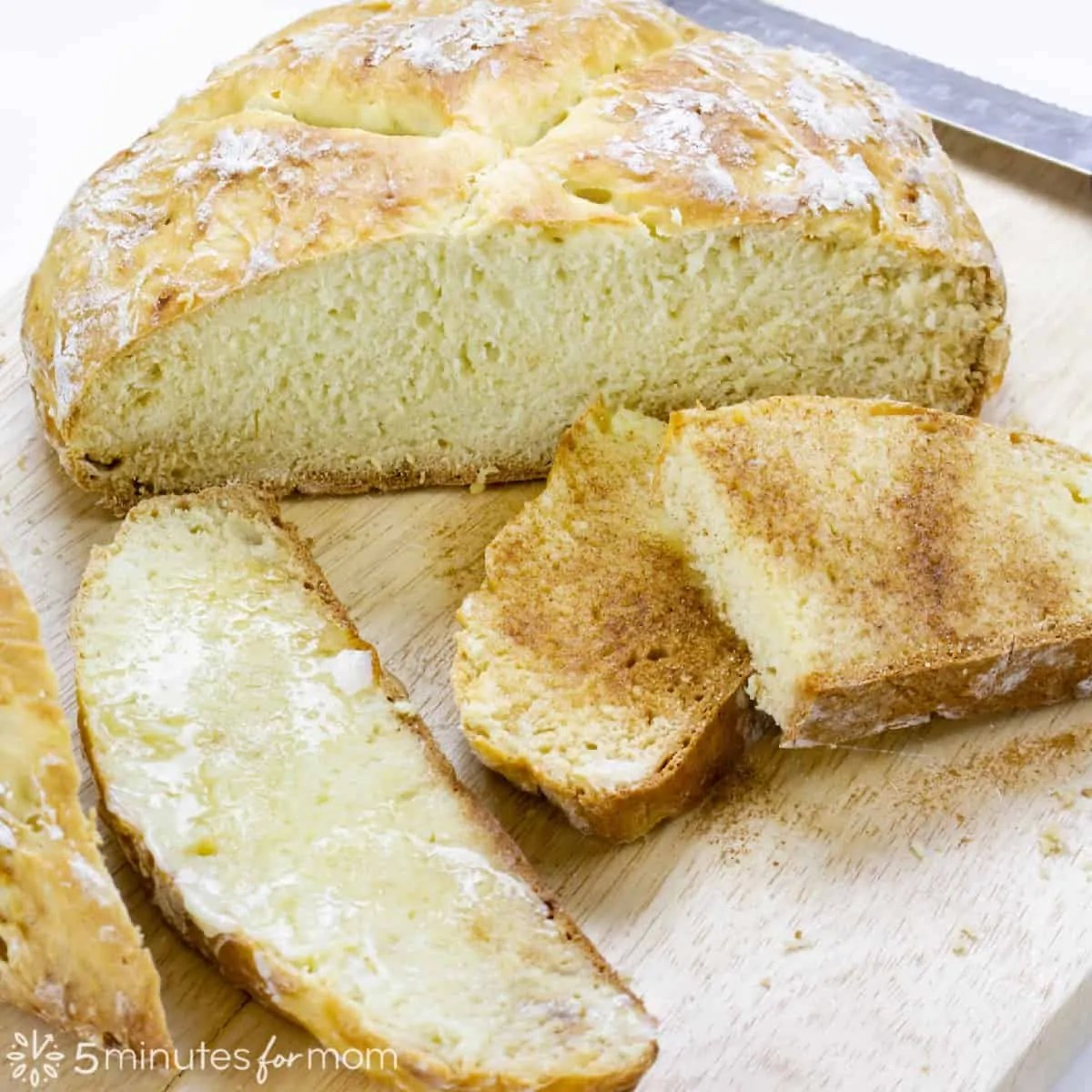
Traditional Irish Soda Bread Recipe
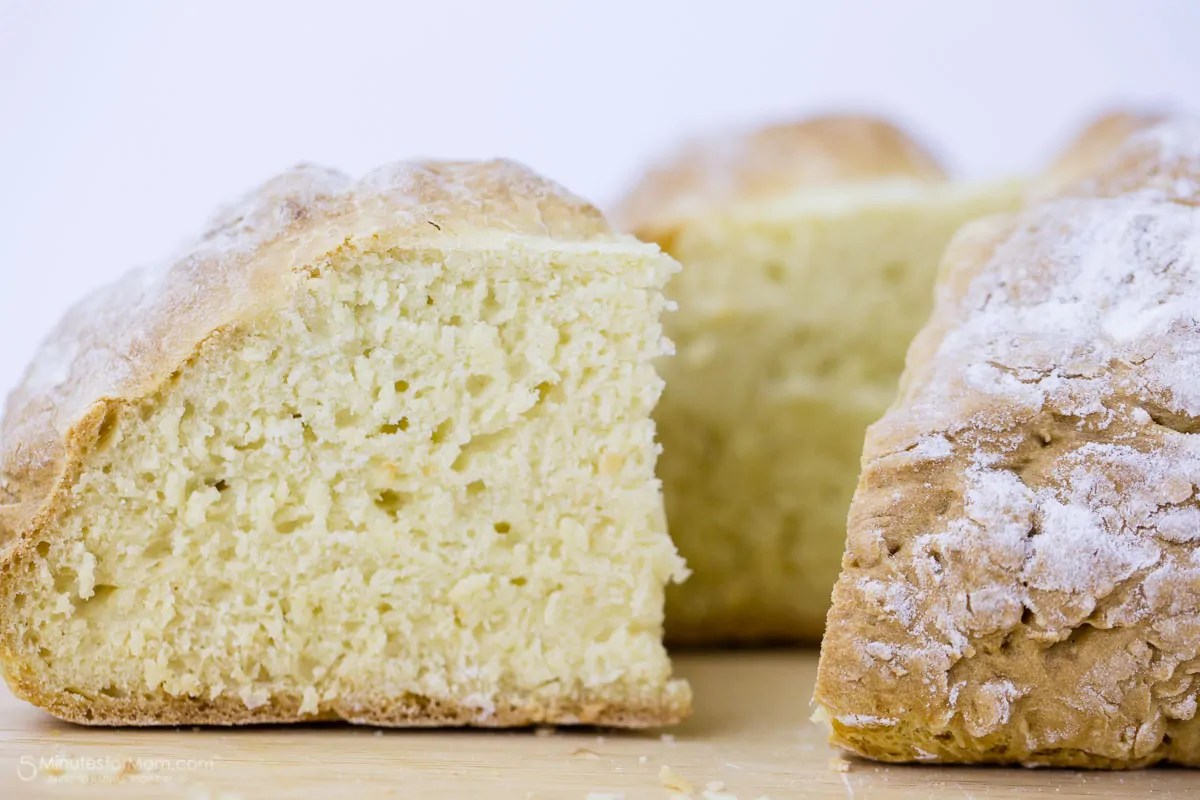

Traditional Irish Soda Bread
Irish Soda Bread is a hearty, delicious addition to the dinner table that is quick and easy to make. Here is how to make a traditional Irish Soda Bread.
4.21 from 77 votes
Print Pin Rate
Course: Bread
Cuisine: Irish
Prep Time: 10 minutes minutes
Cook Time: 45 minutes minutes
Total Time: 55 minutes minutes
Servings: 8
Calories: 272kcal
Video
Ingredients
- 4 cups flour - all purpose or pastry flour or 3 cups all purpose and 1 cup whole wheat (if weighing flour, 4 cups is 480 grams)
- 1 3/4 cups buttermilk or milk soured with 2 Tbsp lemon juice or vinegar. You may need an additional 1 to 4 tablespoons.
- 1 1/2 teaspoons baking soda
- 1 1/2 teaspoons salt
- 2 Tbsp sugar optional and not part of a traditional Irish Soda Bread
Instructions
Preheat oven to 400 F. If you are using a baking stone, place on center rack to heat with oven.
If you do not have buttermilk, make soured milk by adding two tablespoons of vinegar or lemon juice to just under two cups of milk and allow to sit for five minutes, while you prepare the dry ingredients.
In a large mixing bowl, whisk together flour, baking soda, salt (and sugar if you want to sweeten your bread)
Form a well in the center of the flour mixture and pour in 1 3/4 cup of buttermilk or soured milk. (You may not need all two cups of milk, depending on your flour.)
Stir in buttermilk with a fork or spoon to create a sticky dough. If the dough is too dry, add additional buttermilk 1 tablespoon at a time.
When the dough comes together, turn dough onto a floured surface and knead lightly - about three or four times.
Form a large ball and cut into two halves if you prefer smaller loaves.
Shape the loaves into round balls, slightly flattening the tops.
With a sharp knife, cut a deep cross into the top of your loaves.
Place loaf or loaves on parchment lined baking sheet, or heated baking stone, or place large loaf in an oiled cast-iron pot or skillet.
Brush with buttermilk (and melted butter if you prefer.)
For a more traditional baking method, cover your cast iron pot or baking dish with a lid (another pan can serve as a lid to simulate the bastible pot) for the first 30 minutes and then remove for the last 15 minutes of baking time.
If you are making two smaller loaves, you will want to reduce your total baking time to about 35 minutes.
If you are not using a lid or foil for the first part of baking, check it after 25 or 30 minutes. If it is getting two brown, tent it with aluminum foil.
Bread is ready when the center X looks baked through and a toothpick comes out clean. As well, you can tap the bottom of the loaf and it should sound hollow.
Cover with a tea towel, moistened with sprinkles of water, and allow to cool for at least ten minutes.
Serve warm with salted butter and honey or whatever else your heart desires.
Nutrition
Calories: 272kcal | Carbohydrates: 53g | Protein: 8g | Fat: 2g | Saturated Fat: 1g | Cholesterol: 6mg | Sodium: 698mg | Potassium: 138mg | Fiber: 2g | Sugar: 6g | Vitamin A: 87IU | Calcium: 70mg | Iron: 3mg
Pin It For Later
Be sure to pin this Irish Soda Bread Recipe so that you have it for later. And I really encourage you to share the Irish soda bread history with your kids. It’s so important that we keep these stories alive in our children so we can continue to pass on these history lessons for generations.



References and Further Reading:
http://www.kitchenproject.com/history/IrishSodaBreads/
http://www.thekitchn.com/how-to-make-irish-soda-bread-cooking-lessons-from-the-kitchn-186287
http://www.abigailsbakery.com/bread-recipes/history-of-irish-soda-bread.htm
http://www.sodabread.info/history/
http://www.sodabread.info/
http://www.epicurious.com/archive/holidays/stpatricks/sodabread
https://en.wikipedia.org/wiki/Soda_bread
Written by Janice Croze, co-founder of 5 Minutes for Mom
We published the first version of this traditional Irish soda bread recipe in 2017. We’ve updated to answer some of our readers’ questions and we’re excited to share the recipe with you again. So many people have loved learning about Irish soda bread history and we’re grateful to be able to help keep the story alive.
Talk with me: @5minutesformom and Facebook.com/5minutesformom
Pin with me at pinterest.com/5minutesformom
More Recipes For You To Try
You’ll love these recipes for Rosemary Olive Oil Bread and Cranberry Pumpkin Bread.
If you want to bake gluten free bread, check out how to make your own Gluten Free Flour Mix.
And you can try this recipe for Gluten Free Pumpkin Bread.
About Janice
Janice is co-founder of 5 Minutes For Mom. She's been working online since 2003 and is thankful her days are full of social media, writing and photography.
Reader Interactions
Leave a Comment
This site uses Akismet to reduce spam. Learn how your comment data is processed.
24 Comments
Louisa says
I followed the recipe but my dough was very dry I had to add another half cup of liquid and it still didn’t feel right? I would love the recipe in grams if possible as I can’t have yeast atm and miss bread!
I made 1 large loaf that’s currently in the oven but I fear it wil not turn out well as the mixture was far too dry not sure what I’m doing wrong? My measuring cups I’ve used for years without issue so I’m not sure what’s happened here.Reply
Janice says
Hi Louisa,
I am so sorry your bread was too dry. How did your next batch turn out?
1 cup of flour is 120 grams so the recipe would call for 480 grams of flour. I do recommend weighing your flour to have a more accurate measurement.
If you “scoop” flour with a measuring cup, it packs the flour too tightly and the measurement is off. To try and avoid that problem, you can spoon the flour gently into the measuring cup to avoid packing it. Sifting the flour also can help. But ultimately, weighing flour is the best option.
I wrote this recipe years ago and I didn’t realize I hadn’t put the grams option in. Thank you for your feedback! I will add the information about weighing the flour.
Also, as I mentioned in the recipe, you may need up to 4 tablespoons more milk. So adding that extra liquid should help.
Another commenter mentioned that she adds 8 ounces of cream cheese to the recipe to make it more moist.
I hope that helps and I would love to hear how your bread turns out. Thank you so much for reading and sharing your experiences!
Reply
Lorie Werckman says
My Grandmother used to make a bread every few days to serve with tea. She took the recipe to Heaven, we (the grandkids all tried to get the recipe with out any luck) I plan on giving this a try…hopefully it’ll turn out like my Granny’s. Thanks in advance!
Reply
SEVDA says
Why doesn’t anyone say we Irish still call baking soda or bi carb, bread soda.
For years I didn’t know bread soda, bi carb and baking soda were the same product.
Reply
Aimee says
I’ve made a half batch of this bread a few times – it’s always delicious and about the right amount for 4 people alongside some nice soup/stew. I start with 3/4 cup buttermilk and adjust as needed, and bake it in my dutch oven. Easy to make and consistent results.Reply
Susan says
How wonderful to hear! Thank you so much for sharing.
Reply
Janice says
Thank you SO much for sharing Aimee! We really appreciate you!
Reply
Amanda Livesay says
I’ve always made a sweetened version filled with fruit but this recipe is perfect as is! So delicious!Reply
Susan says
What a fantastic idea… We will have to try making it with fruit!
Reply
Jane Saunders says
I’ve always been really bad at making soda bread – until now. All your extra info and guidance is great and very much appreciated.Reply
Laurie Erlacher says
Thanks for the traditional recipe and history of Irish soda bread. It’s so easy to make that I get carried away with add ins. I have made too many versions of soda bread to list but bourbon maple bacon is a favorite. Recently I started adding 8
Ounces of cream cheese to the recipe. It keeps it moist. I know it’s not authentic but it sure is fun thinking up new concoctions with the basic recipe.Reply
Susan says
Thanks Laurie! How great to hear you’ve been making different varieties. It’s always wonderful when you can customize a recipe with your own ideas. How genius to add bourbon maple bacon! And we will have to try adding cream cheese like that… great that it helps it stay moist.
Reply
Deanna Tousignant says
This sounds delicious and way simpler to make than I would’ve expected. I love that you included the history of Irish Soda bread. I am a total history geek, and small things like this make my heart happy.
Reply
Susan says
Isn’t everything better when you know the history? LOL
Reply
Desiree Kretschmar says
Yum! Such a fun recipe for St. Patrick’s Day!
Thank you for sharing!Reply
Liya says
Thanks a lot for the history of this delicious bread!
I bake it quite often en like to play with different sorts en proportions of flour. I also add 1,5 tbs honey instead of sugar, which enriches the flavour ( to my taste ;0). ) My only upset about this bread is that It loses its softness next day. Any advice?Reply
Susan says
Great idea to use honey! Yes, soda bread does tend to lose its softness the next day. One of our readers suggested adding cream cheese to the recipe for extra softness… but we haven’t tested that yet.
Reply
Kim~madeinaday says
Looks great! Pinned for future reference~ Thanks for linking up at MerryMonday!
KimReply
Susan says
Thanks so much for pinning!
Reply
Amanda says
This looks yummy! Am gonna try it today 😀
Reply
Susan says
Thanks! I hope you love it.
Reply
Sandy Bonesteel says
This sounds like it could be the kind of bread my Mom’s friend used to make a very long time ago when I was young. I used to watch her make a bread that sounds like this bread is made. I loved how her bread tasted, but never asked her what kind it was. Now I’m going to make this bread to see if it tastes similar to the bread that my Mom’s friend used to make; that I loved so much.
Thank you for sharing this recipe.Reply
Susan says
Wonderful… I hope it brings back lots of wonderful memories!!!
Reply